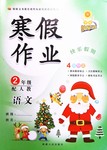题目内容
As the light turned green, I stood for a moment, not _________, and asked myself what I was going to do.
A. moved B moving C. to move D. being moved
B not moving与谓语动词stood同时发生,和主语I是主动关系,表示“站了一会,没有动弹”。动词-ed形式作状语表示被动。不定式常作目的状语。动词-ing形式的被动式表示正在被做的动作。

 学练快车道快乐假期寒假作业系列答案
学练快车道快乐假期寒假作业系列答案The idea of sailing west to reach the riches of the East Indies and the Asian mainland was much in fashion with cultured Europeans during the late fifteenth century. Learned people agreed that the earth was round: their only questions were how long and how dangerous would be a trip to reach the Orient. Christopher Columbus, the son of an unknown weaver, and himself a weaver of ambitious dreams, made his historic voyage to the New World in 1492. He didn't go to school very much, but be learned to read and write Spanish during his travels. He also taught himself Latin because all the geography books were written in Latin. Sailing with a tiny fleet of three ships, the Santa Maria and two smaller ships, the Pinta and the Nina and a crew of ninety sailors, be found the thirty-three-day crossing easier than his nearly-decade-long effort to find royal sponsors willing to support it. The trip drew not only on his own skills as an expert ship's captain, but also on his ability to plan such an expedition, obtain governmental approval and financing, and finally, demonstrate its success so that such explorations could continue. He tried for years to get King Ferdinand and Queen Isabella to supply him with ships and money. Finally they agreed, but he made more demands. He wanted to be made a knight, admiral of the Ocean Sea. He wanted to be the viceroy(总督)and governor general of all lands he would discover. Also he wanted one-tenth of everything he found of value in the new lands. The explorations that followed Columbus-those of Cabot, Verrazano, Cartier, and many others-benefited from a new maritime technology borrowed from Arab sailors and from a variety of new vessels (船,舰) such as the light-weight caravels employed by Columbus. Sailors also perfected sails and various types of riggings that gave ships added stability and greater maneuverability(可操作性)on the open seas. And when leaving sight of the coast, new navigational aids-charts, compasses, and astrolabes-permitted them to determine their position with some, though not perfect, accuracy. Columbus himself made a total of four voyages to the New World but he did not become rich as he had hoped. At the end of his life he only had a pension the king and queen had given him because he was the first to reach the New World. He spent the last few months of his life in bed because of the pain of arthritis(关). Columbus not only discovered a New World, but led the way for other explorers.
1.What was the dream destination of Europeans in the late fifteenth century?
|
A.The oriental countries. |
B.The East Indonesia. |
|
C.The Old World. |
D.The African mainland. . |
2.What preparations did Columbus make for his first voyage to the New World?
①He planned the expedition thoroughly.
②He spent almost ten years in looking for sponsors.
③He gathered a great many ships.
④He hired 90 sailors.
⑤He demonstrated his success of former far-reaching explorations.
|
A.①②③④⑤ |
B.①②④ |
C.①④⑤ |
D.②④⑤ |
3.We can learn from the passage that ________.
|
A.Christopher Columbus was an ambitious explorer |
|
B.he was a geologist with ambitious dreams |
|
C.Columbus became extremely wealthy after making a total of four voyages |
|
D.he was an unsuccessful canvasser(游说者) |
4.What equipment aided the sailors in locating relatively more accurately?
|
A.A variety of new vessels. |
B.The light-weighted caravels. |
|
C.Various types of riggings. |
D.Charts, compasses and astrolabes. |
5.In the passage, the author mainly tells us ________.
|
A.the tragedy of Columbus's life as a whole |
|
B.Columbus's life story and his achievements |
|
C.Columbus's exploration to the East Indies and Asia |
|
D.how Columbus arrived in the New World . |